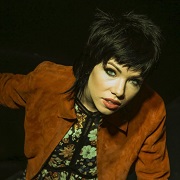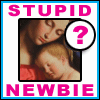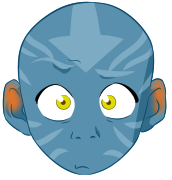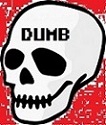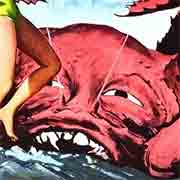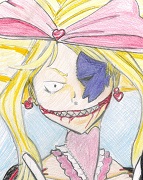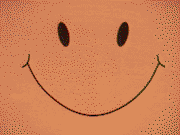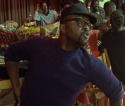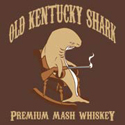|
josh04 posted:I'm a fan of Lindsay Ellis but I'm not sure she's going to convince me that there's such a thing as "lazy worldbuilding" (as opposed to hardworking worldbuilding? strict worldbuilding?) Her main thesis is that the particular setting of Bright is lazy because it's just a few fantasy tropes slapped onto 99.9% of our own society, instead of creatively envisioning what our world would look like after 2,000 years of alternate history with magic and elves. Essentially, "what if black people, but orcs."
|
|
|
|

|
| # ? May 6, 2024 07:09 |
|
exquisite tea posted:Her main thesis is that the particular setting of Bright is lazy because it's just a few fantasy tropes slapped onto 99.9% of our own society, instead of creatively envisioning what our world would look like after 2,000 years of alternate history with magic and elves. Essentially, "what if black people, but orcs." See, you kind of hit the nail on the head there: Bright is not an 'alternate history.' It is not simply failing to 'envision' what the world would look like with magic and elves out of laziness - the motivation behind the way the world is presented is to emphasize that there is no difference. This relates back to the example of "Shrek-lookin' rear end." Critics like Ellis are convinced that this line doesn't make any sense, because in this 'alternate history,' Shrek wouldn't exist. The problem is that this is a speculation couched in nothing, looking away from the way the world actually is. Of course Shrek could exist, because #FairyLivesMatter exists. The joke is that Shrek, like, say, Guess Who's Coming to Dinner, is something that has to exist in order to support the ideological framework of activism that, conveniently, is invisible from the point of view of the protagonists. These milquetoast, reactionary extensions of solidarity with the oppressed exist spontaneously, but they fundamentally do nothing to effect people's lives.
|
|
|
|
There’s like 0% chance that somebody who positions themselves around “worldbuilding mistakes” actually has anything to say. It’s invariably some “PLOT HOLE: Despite being designed to be servants by scientists, replicants are disobedient” poo poo.BrianWilly posted:I feel like a wee bit of this is a wee bit too nitpicky because...well, even though the worldbuilding is in fact kinda weird and makes no sense, this is really only a noticeable problem because the rest of the film isn't compelling or well-written enough to distract from that sort of thing. By which I mean, no one would really give a crap about out-of-place Shrek jokes if only the story surrounding that joke was less balls. Hell, he might be slaughtering a person for all we know.
|
|
|
|
"Elftown is called elftown. It should be called something different. Beverly Hills isn't called "welf town." [???] Also elftown appears to be based on Downtown LA, but Beverly Hills is 10 miles away from Downtown. *exasperated gasp* Nevermind..." Going to watch the rest of this video after I meditate on this koan for a few days.
|
|
|
|
hexachord posted:"Elftown is called elftown. It should be called something different. Beverly Hills isn't called "welf town." [???] Also elftown appears to be based on Downtown LA, but Beverly Hills is 10 miles away from Downtown. *exasperated gasp* Nevermind..."
|
|
|
|
hexachord posted:Beverly Hills isn't called "welf town." [???] “Wealth town”. She’s pointing out that real-life nomenclature isn’t usually as on-the-nose.
|
|
|
|
There are a glut of these video essays now and most of them are pretentious and not as insightful as they think they are.
|
|
|
|
You can tell who really hasn't watched the video because Ellis' criticism is totally on-point and accurate.
|
|
|
|
Yes, the unimpeachable Channel Awesome alum Lindsay Ellis. Totally on point. Totally.
|
|
|
|
Exactly.
|
|
|
|
Ellis is way way better than the rest of Channel Awesome and other video essayists (with the possible exception of Kyle Kallgren), but this video was less about the literary apparatus of analysing film, and more about "is Bright a good film?" which is a way more boring question to ask.
|
|
|
|
K. Waste posted:See, you kind of hit the nail on the head there: Bright is not an 'alternate history.' It is not simply failing to 'envision' what the world would look like with magic and elves out of laziness - the motivation behind the way the world is presented is to emphasize that there is no difference. This gets back to the idea that the Orcs et al are pointless. Just have Joel Edgerton play a Mexican at this point. The only thing you lose is Noomi’s adorable elf ears.
|
|
|
|
porfiria posted:This gets back to the idea that the Orcs et al are pointless. Just have Joel Edgerton play a Mexican at this point. The only thing you lose is Noomi’s adorable elf ears. Well, no. By your estimation, the goblins/orcs in Tolkein's literature are "pointless" because in the climactic battle for the fate of Middle Earth, there are already "regular humans" who choose the side of the Dark Lord, who just happen to be explicit stand-ins for various Asian cultures framed in fundamental opposition to the civilized Nordic pantheon from which Tolkein draws his heroes. What you lose is the direct implication of fantasy tropes as tacit representations of ideology. The Orcs are not "pointless," anymore than the fairies or elves are "pointless." The film is clarifying tropes of fantasy literature as consistent with 'real world' oppression.
|
|
|
|
Phylodox posted:“Wealth town”. She’s pointing out that real-life nomenclature isn’t usually as on-the-nose. Oh that's my bad. But fictional places can have cutesy names without it being a CinemaSin, like Smallville and Metropolis. Or Mount Doom, since we're talking about Tolkien.
|
|
|
|
In the setting of a D&D campaign I ran that lasted almost five years, the High Elves lived in just one city called Aglarond. My friends, who did not give a poo poo about my elaborate backstory and just wanted to play the game, literally just called it Elf Town (alt., Elfsburg, Elfington). For years. After all, there was only one so I guess if you just said Elf Town everybody would know what you were talking about. Anyway, dumb complaint, I've lit. seen people spontaneously coin the name Elf Town IRL.
|
|
|
|
K. Waste posted:What you lose is the direct implication of fantasy tropes as tacit representations of ideology. The Orcs are not "pointless," anymore than the fairies or elves are "pointless." The film is clarifying tropes of fantasy literature as consistent with 'real world' oppression. Except Lord of the Rings isn’t trying to say anything about race or oppression. What it does say is unfortunate and unintentional, rooted in Tolkien’s biases. Bright is trying so hard to be about race and oppression, but it fails kind of dully. The movie positions orcs as urban gang stereotypes and elves as elite power brokers, but nothing is really said, done, or explored through that. It’s just kind of there. Ellis’ best point in her essay is that the antagonists, while elves, are outliers, unrelated to the ostensible systems of elven oppression of the other races. The only other powerful elf we see is the special agent dude, who’s sketched in so flimsily that we don’t know where he stands or what he represents. Orcs are portrayed as oppressed, but we don’t ever really explore the hows or whys except the whole “they once chose to serve the Dark Lord” thing, which is really unfortunate, because it portrays racism as all stemming from some past event (for which the oppressed are actually culpable, ew) rather than an ongoing system that benefits the oppressors.
|
|
|
|
Phylodox posted:Bright is trying so hard to be about race and oppression What are you basing this on, as meaningfully different from what Lord of the Rings does, where, for instance, elves are also depicted as elite power brokers and so on. Sir Kodiak fucked around with this message at 20:07 on Feb 4, 2018 |
|
|
|
Sir Kodiak posted:What are you basing this on, as meaningfully different from what Lord of the Rings does, where, for instance, elves are also depicted as elite power brokers and so on. Because Lord of the Rings is a clear-cut black-and-white fantasy adventure tale. The orcs are unambiguously evil, the elves are good and helpful. It’s not exploring an oppressed underclass at all.
|
|
|
|
You done did it now.
|
|
|
|
Phylodox posted:Because Lord of the Rings is a clear-cut black-and-white fantasy adventure tale. The orcs are unambiguously evil, the elves are good and helpful. It’s not exploring an oppressed underclass at all. Right, Lord of the Rings presents racial distinctions as being, well, black and white. That doesn't make it not about race and oppression. It just defines what it's saying about them. Like, the objection appears to be that Bright has even a bit of nuance to it.
|
|
|
|
hexachord posted:"Elftown is called elftown. It should be called something different. Beverly Hills isn't called "welf town." [???] Also elftown appears to be based on Downtown LA, but Beverly Hills is 10 miles away from Downtown. *exasperated gasp* Nevermind..." Chinatown? What a silly concept.
|
|
|
|
My suspicion is that the Dark Lord was actually Christlike and the members of the grand alliance of nine races that stopped him or her were the baddies.
|
|
|
|
Sir Kodiak posted:Right, Lord of the Rings presents racial distinctions as being, well, black and white. That doesn't make it not about race and oppression. It just defines what it's saying about them. Lord of the Rings wasn’t trying to be nuanced. Bright clearly is, but “even a bit of nuance” doesn’t cut it, here. Ellis points out that the movie has a kind of “racism is bad” message while putting the focus on some misguided individuals instead of the system itself or all the people who benefit from it.
|
|
|
|
I mean the Elves are Jews--they're powerful and wealthy but also somewhat oppressed and with a strong sense of cultural identity and access to ancient magics and thaumaturgical techniques.
|
|
|
|
Sorry but "Lord of the Rings wasn't trying to be nuanced" is a totally bizarre notion about a series of books that the author made up a plausible fake language and entire history for.
|
|
|
|
Phylodox posted:Except Lord of the Rings isn’t trying to say anything about race or oppression. What it does say is unfortunate and unintentional, rooted in Tolkien’s biases. Bright is trying so hard to be about race and oppression, but it fails kind of dully. The movie positions orcs as urban gang stereotypes and elves as elite power brokers, but nothing is really said, done, or explored through that. It’s just kind of there. Ellis’ best point in her essay is that the antagonists, while elves, are outliers, unrelated to the ostensible systems of elven oppression of the other races. The only other powerful elf we see is the special agent dude, who’s sketched in so flimsily that we don’t know where he stands or what he represents. Orcs are portrayed as oppressed, but we don’t ever really explore the hows or whys except the whole “they once chose to serve the Dark Lord” thing, which is really unfortunate, because it portrays racism as all stemming from some past event (for which the oppressed are actually culpable, ew) rather than an ongoing system that benefits the oppressors. Intent is not the same thing as meaning. Tolkien does not need to intentionally craft Lord of the Rings as a narrative of the symbolic victory of Western European civilization over the dark Other in order for us to critique this. In the case of Bright, the film appropriates Tolkien's mythopoeic imagery in order to emphasize that this is not merely a phenomenon of Tolkien's "unfortunate" bad thoughts. His literature is just one symptom of ideological values that manifest in systemic oppression and socioeconomic inequality. With criticisms of Bright, what we see is the persistence in attempting to completely disassociate the straightforwardly depicted oppressive order of the setting from the apparently completely unrelated plot, in which the protagonists need to act outside of the law in order to achieve some semblance of justice. Ex: The antagonists of the film are elves, but they are "outliers, unrelated to the ostensible systems of elvis oppression of other races." The burden of interpretation is upon you to substantiate this claim. Which is to say, how can these individual elves not be related to the omnipresent systems of injustice that permeates the entire ideological and structural fabric of their society? The villains of the film can not operate in the manner that they do without the system being stacked in their favor. Their motivations do not exist in a vacuum, dominant ideology is what provides them a smokescreen of validity. It is the exact same phenomenon we observe in the behavior of the police officers. This extends to your flawed apprehension that the racism of the film stems only from a past event. The past event is a rhetorical justification for the actual root of socioeconomic inequality and systemic oppression, which is the straightforward manipulation of political and economic systems in order to concentrate wealth and power into the hands of a privileged few. porfiria posted:I mean the Elves are Jews--they're powerful and wealthy but also somewhat oppressed and with a strong sense of cultural identity and access to ancient magics and thaumaturgical techniques. The elves are not Jews. They're the blonde-haired, blue-eyed, fair-skinned wet dream of Nazi occultism. The characters in the film whose experience and treatment that most parallels Jews are the Orcs who, some thousands of years ago, chose the side of the Dark Lord, a.k.a., killed Christ.
|
|
|
|
K. Waste posted:Intent is not the same thing as meaning. Tolkien does not need to intentionally craft Lord of the Rings as a narrative of the symbolic victory of Western European civilization over the dark Other in order for us to critique this. In the case of Bright, the film appropriates Tolkien's mythopoeic imagery in order to emphasize that this is not merely a phenomenon of Tolkien's "unfortunate" bad thoughts. His literature is just one symptom of ideological values that manifest in systemic oppression and socioeconomic inequality. Obviously, the implication is that Jesus WAS the Dark Lord, leading the oppressed races (Orcs/Germanic tribes) against the Romans/Elves. Noomi is trying to bring him back because she's a Jew for Jesus and...I'm bored now I'm gonna go eat some Chipotle.
|
|
|
|
Phylodox posted:Lord of the Rings wasn’t trying to be nuanced. Bright clearly is, but “even a bit of nuance” doesn’t cut it, here. Ellis points out that the movie has a kind of “racism is bad” message while putting the focus on some misguided individuals instead of the system itself or all the people who benefit from it. Yeah, as Hundu has pointed out, nuance is the wrong word here. Bright isn't more nuanced than LotR. It's just less racist. Like, LotR is sufficiently racist that we have to say it's not about race because it would be super awkward if it was. Which, I'll accept that Tolkien wasn't attempting to comment on real-world race relations in writing LotR. But the fact that Bright is based on a modern, intersectional understanding of race does not, I think, create a responsibility for it to then elaborate on a deconstruction of how systems of oppression work or perform some other serious examinations of race. It can just be aware enough of what it's doing to not make orcs inherently evil mud people and still have its focus be on a modern-day fantasy adventure. I'm happy to have that sort of movie.
|
|
|
|
The orcs are brutalized British Tommies, straight up. There is no attempt in the book, not even implicitly, to "other" them as fantasy turks, persians or africans or whatever. They're us. There ARE fantasy steppe humans, some kind of snake worshipping civilization, and people from Harad which is maybe some kind of fantasy Africa. They are pointedly NOT depicted as individually or willfully evil or any worse than the humans of Gondor and Rohan. Theoden and Snake-King guy, IIRC, literally have a chivalrous duel on horseback with respect given on both sides. The point is that Sauron has lied to and manipulated all the nations of earth--took whatever shape and dangled whatever carrot he needed in front of them to get them to join his coalition. The "Men of the West" don't have any advantage of moral clarity (I mean poo poo, both their kings end up hypnotized in some way by Sauron), they're basically just (if you read the backstory) the last remnants of a civilization that already followed Sauron and got effed up so bad they were wiped out by a straight up Old Testament meteor. The Easterlings and Southrons or whatever don't really know poo poo about Sauron (Gandalf was lit. one of five angels who were supposed to spread the warning all over the earth, the guys who were supposed to go east and south died in a boat accident or something), but they do know the men of the West used to be arrogant powerful assholes who raided their countries for slaves a thousand years ago so gently caress 'em. Harime Nui fucked around with this message at 20:51 on Feb 4, 2018 |
|
|
|
porfiria posted:Obviously, the implication is that Jesus WAS the Dark Lord, leading the oppressed races (Orcs/Germanic tribes) against the Romans/Elves. Noomi is trying to bring him back because she's a Jew for Jesus and...I'm bored now I'm gonna go eat some Chipotle. She’s trying to bring him back for the same reason that American evangelicals are attempting to resummon Jesus IRL.
|
|
|
porfiria posted:I mean the Elves are Jews--they're powerful and wealthy but also somewhat oppressed and with a strong sense of cultural identity and access to ancient magics and thaumaturgical techniques. I think the elves are sort of a late-80s American view of the Japanese. EDIT: I feel like Bright, cribbing from shadowrun as it does, is at least a little bit set in the future of the 80s/early 90s. a foolish pianist fucked around with this message at 21:18 on Feb 4, 2018 |
|
|
|
|
a foolish pianist posted:I think the elves are sort of a late-80s American view of the Japanese. Ooh I like this. They really should have had an elf with a katana at some point.
|
|
|
|
Sir Kodiak posted:But the fact that Bright is based on a modern, intersectional understanding of race does not, I think, create a responsibility for it to then elaborate on a deconstruction of how systems of oppression work or perform some other serious examinations of race. It can just be aware enough of what it's doing to not make orcs inherently evil mud people and still have its focus be on a modern-day fantasy adventure. I mean...it doesn’t have to, no. No movie has to do anything, regardless of whether or not it would make it better or more interesting. As it is, I like Bright okay, but not because of anything it has to say. It succeeds 100% on the charm and chemistry of Will Smith and Joel Edgerton. Without them, it’s just kind of an aimless, muddled movie.
|
|
|
|
Phylodox posted:I mean...it doesn’t have to, no. No movie has to do anything, regardless of whether or not it would make it better or more interesting. As it is, I like Bright okay, but not because of anything it has to say. It succeeds 100% on the charm and chemistry of Will Smith and Joel Edgerton. Without them, it’s just kind of an aimless, muddled movie. Except that, apparently, because Bright doesn't use black-and-white fantasy races, where one's inherently evil and all that, it then does have to be "about race and oppression" such that it examines them as at a systemic level, because otherwise it's a failure.
|
|
|
|
Sir Kodiak posted:Except that, apparently, because Bright doesn't use black-and-white fantasy races, where one's inherently evil and all that, it then does have to be "about race and oppression" such that it examines them as at a systemic level, because otherwise it's a failure. Yeah, to me and, obviously, Lindsay Ellis. I mean, it could have been good aside from that, and it would still be unfortunate, but its good points are enough to carry it in spite of that. But it’s not that good. It’s a kind of middling movie with two standout performances.
|
|
|
|
Yeah, was just curious if there was some reasoning behind what seems like a pretty nonsensical rule, that if fantasy racism is depicted, it must be deconstructed or the movie has somehow failed.
|
|
|
a foolish pianist posted:EDIT: I feel like Bright, cribbing from shadowrun as it does, is at least a little bit set in the future of the 80s/early 90s. I like Lindsay Ellis, and I don't think she's wrong, exactly, but i don't think she's right either, because taking Bright to task for having a flimsy and muddled message about race is like taking Cobra to task for having a flimsy and muddled message about gang violence in Reagan's America. Old Kentucky Shark fucked around with this message at 22:15 on Feb 4, 2018 |
|
|
|
|
The question is what folks mean by "examination," and even further "serious examination." There is no more or less examination in Bright than there is in Who Framed Roger Rabbit?, District 9, or RoboCop, and there is certainly no differentiation in the 'seriousness' of the text. All four of these films are either straight-up comedies or black-comic satires. What all four of the films do is straightforwardly present the social reality of the setting. In RoboCop we might get crass commercial breaks, in District 9 we might get interviews with bigoted and distrustful civilians towards the alien immigrants, but, again, nothing is being 'examined' here. The film is showing you what's going on because it's relevant to the narrative. 'Examination' and 'seriousness' are convoluted values. They assume that the straightforward abjection and crassness of the symbolic order of the film aren't enough. The irony is that Ellis criticizes Bright for its presentation of exposition, when all of the exposition in the film occurs in the context of developing the relationships between characters and foreshadowing events in the story. There is, indeed, very little overt exposition in the film, which turns out to also be a common criticism of the film, that spectators are confused by the setting because of the lack of 'world-building.' The disconnect is that 'examination' is presumed to be paramount in dealing with 'serious issues,' and Bright turns out to be a predominately action-oriented narrative. The opening credit prologue of orc street art turns out to be the most overt example of exposition that we get. But it also, more interestingly, foreshadows the fundamental conflict between Jakoby and Ward. The latter, after all, sees the former as a potential traitor because, as it's revealed in a tense stand-off, Jakoby falsified a report in order to protect an orc street tagger from being railroaded by the system. The problem here is not the lack of examination in the text. Examination is what you do by engaging with a narrative that is inherently, structurally limited to only conveying a certain amount of information, leaving it up to the spectator to elaborate on what is implicit. The problem is actually that Bright is too nuanced. Like the social dangers faced by the orc street artists, the Fogtooth gang and their leader are railroaded by confused spectators into being stereotypical thugs, when what actually happens in the movie is that Dorghu is angry because he's trying to make his neighborhood a neutral and peaceful territory, and the elves/cops hosed it up. On the other hand, Poison does not want the wand so that it will grant him wishes of wealth. He just wants to walk again. By adapting fantasy tropes to the social realities of a contemporary urban city, Ayer is able to present nuances that undermine dominant ideological constructions of how street crime manifests and operates. They aren't even gangs anymore. They're clans, autonomous organizations of family groups existing in the margins of colonial hegemony. They are fundamentally reactionary organizations, but they are also contrasted with the odorous machinations of the police force and the elf Inferni clan. (Hmm, Inferni, to what could this possibly be referring?) The 'street gangs' are stereotyped by the 'good guys' as serving the Dark Lord, when the narrative of the film is that it is the cops and elves who behave the most overtly like stereotypical gangs. The orcs are 'un-dignified,' as it were, but they are at least honest. They don't and can't hide behind a cult of hero-worship and nepotism. They (or just some punk street artists) may claim the Dark Lord, but when it comes to actually serving injustice, the footprint left by the cops and elves is far more infernal. Dorghu's attempt to 'make' his son by having him execute Jakoby turns out to be just a pale imitation of what the cops have already tried to get Ward to do. The resolution of the first scenario is that Ward is forced to kill four of his fellow officers to save one. The resolution of the second is that all the orcs live.
|
|
|
|
Finally got around to seeing this, so loving dope. Best fantasy movie since Snow White + Huntsman, best cop movie since End of Watch. Jacoby better be running for mayor in the sequel.
|
|
|
|

|
| # ? May 6, 2024 07:09 |
|
I've used up all my critical energy in the Black Panther and Three Billboards threads, so suffice it to say this movie sucks poo poo. Welp, bye.
|
|
|


